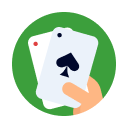Evan Jarvis
Legend
Platinum Level
If I can ask anything, then I have several philosophical questions.
1) What useful/unique product poker is giving to the society?
2) What chemical reactions occur in the body when human is placing a bet? How and why these reactions differ from those that occur during drug consume?
3) If 100 year life is 24h*365d*100yr = 876K hours is our stack in the game of life, and we do understand that we're paying ante every second, we also understand that 30% is sleep time, some % will be spent for brushing teeth, shower and so on, so we'll be left with some amount of effective time. What makes poker so special that people prefer to spend big portion of their effective life time playing it?
4) If rake in MTT is 10%, and daily tournament is 10K grtd with $110 buy-in, then how many days needed for poker site or casino to generate 10K profit?
5) What is the difference for the computer server when it hosts 3 types of tournaments for 1000 players:
type A) Freeroll
type B) $1.1 buy-in, 1Kgrtd
type C) $215 buy-in, 200K grtd.
Will PC server consume much more electricity or internet traffic in case of A or B or C?
=============================================================
Thanks.
1) We purely provide entertainment. Poker is a game, it's not really a service that benefits society, just offering a dance partner for people who want to play a game and be entertained.
2) I don't know the exact answer, but the high of gambling, wagering, making bets, uncertainty is definitely similar to many drugs. Something I would like to look more into actually
3) Some people just find games of chance pleasurable, some like movies, some like hikes, some like family, some like singing. This is just what some people do to find their enjoyment and for many other people it wouldn't fit into any sort of 'special category'
4) Depends how many players enter each day. Once they hit 1k entrants they'd have the profit. In general the house usually gets around 3rd place money in any given tournament
5) This is outside my wheelhouse as I'm not a techy guy, I would guess the difference is very minimal except in cases where a huge amount of players are online (like we saw the stars tournaments with 50k+ players tend to slow down servers)
Thanks for getting me to think outside the box! This was a nice change of pace, and I'm definitely going to look more into the whole 'effects on your brain on poker' as I think the topic is very interesting indeed
Cheers!






